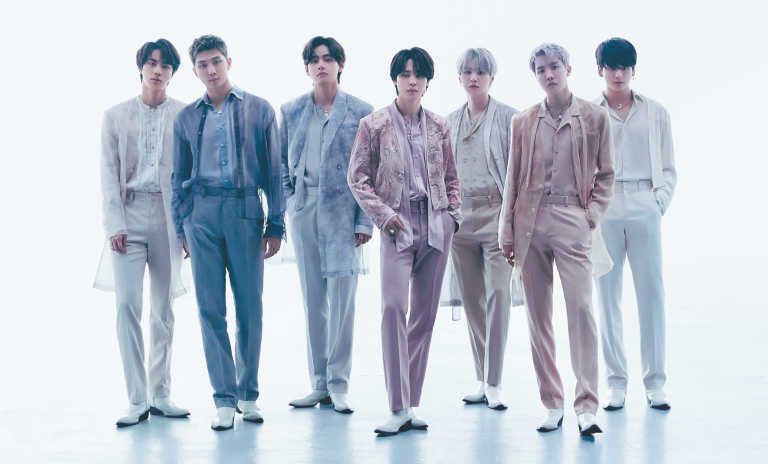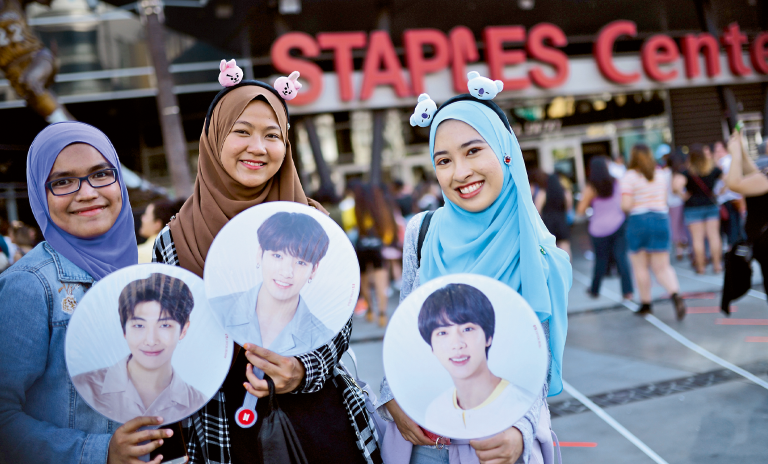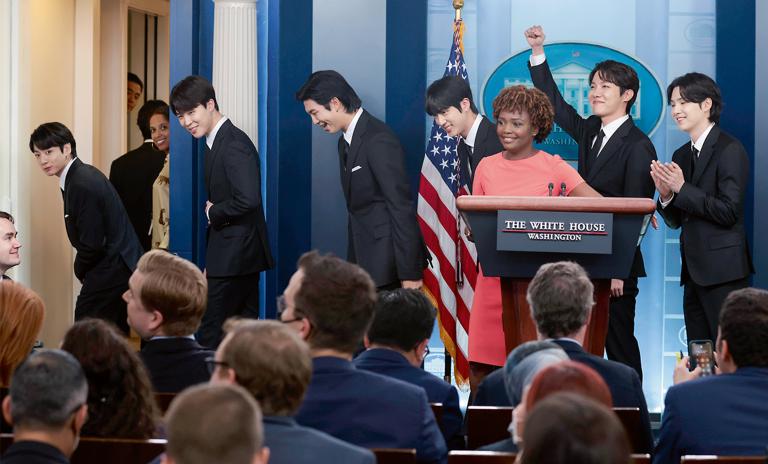Art and Business
![{[downloads[language].preview]}](https://www.rolandberger.com/publications/publication_image/TA38_EN_Covers_1_FINAL_download_preview.jpg)
The arts have much to offer for improving business strategies. Think:Act calls on seasoned artists to help business leaders unlock their creative side.



It might seem like trivial pop music, but the commercial success that K-pop has managed to generate in just a little more than a decade has some powerful lessons for non-pop business.
Just look at South Korea’s BTS if you want some proof of how big a pop phenomenon can be. It is, by some distance, the biggest K-pop act in the world. BTS alone generated a staggering $4.65 billion for South Korea's economy in 2019, according to The Hollywood Reporter. Statista claimed this was equal to 0.3% of the nation's GDP, noting that Korean Air, the country's largest airline, contributed 0.7%.

The K-pop business is dominated by a handful of multidisciplinary entertainment companies that bankroll, develop and mastermind a dizzying range of acts. Chief among them are Hybe (previously Big Hit Entertainment), SM Entertainment, JYP Entertainment and YG Entertainment. This is pop music on an industrialized scale, making the US factory line music model pioneered by Berry Gordy at Motown in the 1960s seem positively quaint.
16.3 BILLION: The number of streams BTS had collected on Spotify by April 2021, beating out Coldplay.
But how did K-pop, once supposedly a niche concept, become such a staggering success? And what can the world of business learn from it? For one, K-pop production houses are complex machines, covering every creative and business aspect of the acts they handle, from records and tours to merchandise, branding deals and social media. A range of complementary and competing acts coexist under the same umbrella at these production houses. "It's like creating a movie," explains Shin Cho, the head of K-pop and J-pop for Asia at Warner Music Korea. "There's a universe in there and there are characters that are integrated."
The careers of these acts are intricately planned in advance, often stretching eight or nine years into the future, Cho explains. "The companies map out how this universe and how these storylines play out." This approach is taken for every act they represent, meaning some will have careers running in parallel and newer acts will be developed to replace others as their appeal wanes. "These labels not only work on your music, your management and your brand deals, they are often housing, feeding and dressing the stars," says music writer Jeff Benjamin who has been covering K-pop since 2011.
Hybe looks after BTS along with TXT, Enhypen, Seventeen and Yehana to name just a few. Its website feels less like that of a record label and more like that of a hedge fund, with one section devoted purely to investors. SM Entertainment, meanwhile, represents pop acts, actors, models and athletes. It has over 40 musical acts currently in its roster. All these acts are precision-tooled to appeal to multiple audiences simultaneously, creating a mélange that runs counter to the traditional rules of pop. "Strategically you can put [groups] into different units," explains Cho. "You can have vocal units of four guys or more singer-songwriter acts; you can also put rappers in there and dancers. You can put the different puzzle pieces together."
Blackpink has a mere four members, BTS has seven, Seventeen is something of a misnomer in that it has 13 and Neo Culture Technology has an astounding 23 members that break into subunits that can target multiple audiences concurrently. Benjamin argues this hybridization is a calculated feature rather than a desperate and scattershot strategy. "A key point of K-pop is making sure these groups, or even the solo singers, can appeal to multiple interests," he says. "I remember hearing my first K-pop song and being blown away by the fact that it had moments that sounded like a ballad, it had moments of rap, it had a dance break, it had autotune. If you lean towards rap, if you lean towards R&B [or other genres], you can still find something in so many of these acts."
Having multiple focal points both across your products and within your products becomes symbolic of a new strategy for success. With the moving parts centrally controlled, companies can have products that are emerging, peaking and sunsetting simultaneously, with one stepping in to replace the one before it as it approaches the end of its lifecycle. Apple understood this with the iPod where product differentiation allowed consumers to move differently through the portfolio depending on their requirements. A stable of K-pop stars is no different.

What makes K-pop different in business is how it industrializes fandom and positions fans as part of the project, not just passive consumers. "The K-pop companies start off with the core audiences," explains Cho. "From the get-go, it's about creating fandom rather than building awareness first and bringing fans through that way," Benjamin concurs. "In K-pop it's about making sure that all things go to the fans first," he notes. "It's just so competitive that you can lose your fans to another group any day. That's a big business play."
43 MINUTES: How long it took BTS to reach one million followers on Instagram.
Weverse is a prime example of this dynamic in action. It is a bespoke social platform created by Hybe in 2019. It controls and owns all the fan data rather than running everything through a third-party platform. "It is a brilliant platform as it was the first time BTS members got to individually speak to fans," says Benjamin. "Previously they had their Twitter account that all seven of them posted from." Weverse comes with exclusive content and a merchandise store, making it both a community hub and retail outlet. "They are reaping the benefits of keeping all that in-house, which leads to greater profit margins," argues Benjamin.
Cho suggests that BTS created a sea change in fan engagement and now others are slipstreaming what they did. "It was half-and-half before, keeping some mystery but at the same time super-serving the fans," he says of the older management approach. "BTS went above and beyond, having interactions with the fans that led up to the [modern] K-pop strategy where you have to constantly put out content that people cannot be bored of."
The old rules of anglophonic pop are crumbling and both K-pop and Latin music are changing the rules of linguistic engagement. In 2020, the Learn Korean With BTS tutorial series started on Weverse, giving non-Korean fans a new entry point into better understanding this world. This tied into a growing trend on YouTube where Korean fans translated pop videos and interviews for non-Korean speakers. K-pop fandom exists as a hybrid of English and Korean, with fans becoming polyglots as a necessary part of their fandom.

108.2 MILLION: The number of times BTS' Butter video was viewed on YouTube within 24 hours.
This is the ripple effect of K-pop companies and artists encouraging fan-generated content. The view is that UGC (user-generated content) and official content are not in competition; they are two sides of the same coin. "K-pop in Korea started with less strict copyright rules than other Western markets," states Cho. Fans are not there just to be sold to; they are rewarded as evangelists for recruiting new fans. BTS fans call themselves the ARMY for a reason – it also stands for Adorable Representative M.C. for Youth. Making lots of content available for free does not necessarily dilute the price of things when you want to charge, either, as BTS's livestream in October 2020 proved with just under one million paying viewers and grossing an estimated $35 million. Free can become a runway for paid.
K-pop companies are certainly about forward propulsion, but they are not about chasing the latest market trends to try and appear omnipotent. They will carefully weigh up new opportunities and technologies, deciding when the optimum moment to pursue something is, such as Hybe creating Weverse. Equally, they will withdraw from something if it feels wrong or if it, after further investigation, could fall short. JYP Entertainment, for example, had planned to work with technology company Dunamu to create an NFT platform for its acts. Some due diligence later and the project was off. "At this moment, we have decided to terminate our business contract with each other after mutual agreement," they said in a joint statement.
It is rare that companies will publicly admit they made a mistake, but the powerful survival instinct in K-pop companies sees admitting where they were wrong as being as strong a virtue as proclaiming where they were right. They also see what are ostensibly rival companies as entities to invest in rather than entities to compete with. In 2021, Big Hit Entertainment invested in rival company YG Entertainment. Collaboration, they argue, can be more profitable than competition.
The major economic contribution of K-pop to the Korean economy and its cultural export potential has given K-pop companies significant soft power with regard to government policies. It represents a new Korea, sitting alongside the international success of TV shows like Squid Game and films like Parasite. "That was a huge part in Gangnam Style and PSY breaking out in 2012," says Benjamin. "I think it really got many people into this idea that music in Korean could be fun and interesting." Cho regards K-pop as the global manifestation, both culturally and economically, of a new type of national pride in the country post-independence in 1948. "Korean culture started off with a 'we can do this so let's do it together' mentality," he says. "The government has always been supportive of this idea of Korea performing on the world stage."
The government has put considerable money and resources into promoting its cultural products globally, seeing it as a tactical investment that will boost the economy on a long-term basis. The impact is such that the government was recently debating if the members of BTS should be excused from doing national service, something that was previously only considered for internationally successful sports stars. K-pop is a powerhouse business not just because it breaks old rules; it is a powerhouse business because it is constantly writing entirely new ones.

![{[downloads[language].preview]}](https://www.rolandberger.com/publications/publication_image/TA38_EN_Covers_1_FINAL_download_preview.jpg)
The arts have much to offer for improving business strategies. Think:Act calls on seasoned artists to help business leaders unlock their creative side.
